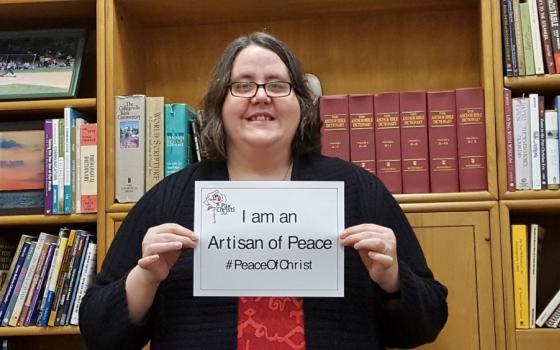We Christians have just celebrated Christmas Day, an opportunity to celebrate the in-breaking into our wounded and divided world of Emmanuel, God-with-us, the Prince of Peace.
The radical message of Christmas tends to get lost among the decorations, festivities and general commercialization of the holiday. Yet we must remember what it is that we truly celebrate this liturgical season, that God-with-us took human form as a fragile and vulnerable baby during a time of great uncertainty, violence, and oppression. Soon after his birth, the violent politics of the time caused the Holy Family to flee to Egypt, seeking refuge and safety in a human experience sadly familiar to millions of refugee families today. The Gospels record how Jesus sought ways through his life and ministry to lift up human dignity, to bring reconciliation to divided places, and to challenge systems of oppression. Those of us who follow the way of Jesus are called to do the same in our own lives and in our own time, knowing that God is with us on the journey.
This weekend, we join in solidarity with people of goodwill the world over to welcome the coming new year with joy, hope and, perhaps, a little trepidation. 2017 of course comes on the heels of 2016, a year with its own uncertainty, violence and oppression, including the global refugee crisis and the never-ending cycle of war and violence at its roots, the political upheaval of Brexit and the U.S. presidential election, terrorist attacks, and the killing of unarmed people of color and of police officers in the line of duty. Each of us no doubt has our own personal and communal struggles and losses to add to the list.
New Year's Day offers us an opportunity to pause, take stock and make resolutions for how we will choose to face the new year and its as-yet unknown unique mix of challenges, opportunities and blessings. For nearly the past 50 years, the Catholic church has recognized New Year's Day as the World Day of Peace, with the pope releasing a special message for the day. This year, Pope Francis has titled his message Nonviolence: a Style of Politics for Peace.
I must admit that, as a Sister of St. Joseph of Peace, I was delighted when this year's theme was announced. My religious community pursues social justice as a path to peace and has made a commitment to grow together as nonviolent peacemakers. In my very first contribution to Global Sisters Report two and a half years ago, I shared that, "I struggle in my attempts to grow in nonviolence. But thankfully, I am not on my own. I am a member of a religious community that has made this commitment together." Nonviolence is not a path to walk alone.
With this year's Peace Day message, Pope Francis has invited each of us to resolve to grow in nonviolence. "In 2017, may we dedicate ourselves prayerfully and actively to banishing violence from our hearts, words and deeds, and to becoming nonviolent people and to building nonviolent communities that care for our common home. Nothing is impossible if we turn to God in payer. Everyone can be an artisan of peace."
Pope Francis recognizes that nonviolent peacemaking is not the exclusive territory of Christians. Compassion, peace and nonviolence are messages common to many religious traditions. Yet the life, ministry and teaching of Jesus offer us what Pope Francis calls a "radically positive approach" centered on unconditional love. "To be true followers of Jesus today," according to Pope Francis, "also includes embracing his teaching about nonviolence."
Luckily, we have a roadmap for the journey in the Gospel stories. "Jesus marked out the path of nonviolence," writes Pope Francis. He highlights the stories of Jesus teaching his disciples to love their enemies and turn the other cheek (Matthew 5), intervening in the attempted stoning of the woman caught in adultery (John 8), and telling Peter to put away his sword (Matthew 26). "He walked that path to the very end, to the cross, whereby he became our peace and put an end to hostility."
Sadly, many people, even Christians, dismiss nonviolence as ineffective. Others consider it to be passive or even irresponsible in the face of evil. Yet Jesus chose to resist evil through active nonviolence in every sphere. In an essay in the book, Resist! Christian Dissent for the 21st Century, Curtiss Paul DeYoung points to three key modes of resistance practiced by Jesus in the Gospels. First, Jesus "resisted the popular notion of who was 'worthy' of relationship" and became friends with those on the margins of society, "creating a wide web of relationships." Second, Jesus "resisted stereotypes and transformed cultural images," instead using alternative positive descriptions of those on the margins, such as Samaritans and women. Third, Jesus resisted through public protest, such as the incident against the money changers in the temple.
We are called to walk the path of nonviolence in every sphere of our relationships. Like Jesus, we navigate relationships with each other, the state, society and economy each day. Each of these encounters offers us an opportunity to choose nonviolence grounded in unconditional love. If we are to be artisans of peace, our social context is our canvas, and our actions, responses and choices are our brush strokes. I don't know about you, but most of my opportunities for growing in nonviolence present themselves close to home — friends, family, coworkers, you name it. Every word spoken or action chosen is a chance to build up or to tear down.
I suspect the coming year will also provide many opportunities to join with others in active nonviolent resistance to systemic oppression, hateful speech and policies that negatively impact people on the margins of society. Pax Christi USA's website offers some good suggestions for starting the new year by celebrating the World Day of Peace.
Remember, nonviolence is not a path to walk alone.
[Susan Rose Francois is a member of the Congregation Leadership Team for the Sisters of St. Joseph of Peace. She was a Bernardin scholar at Catholic Theological Union and has ministered as a justice educator and advocate. Read more of her work on her blog, At the Corner of Susan and St. Joseph.]

